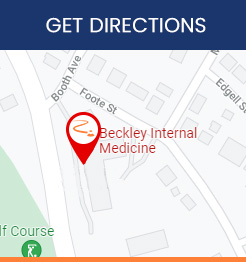Pap Smear Screening Specialist Q&A
The Pap test (or Pap smear) detects precancers, which are cell abnormalities in the cervix that can progress to cervical cancer if not managed properly. Having frequent pap screenings helps prevent cervical cancer and promotes overall health. Dr. Elizabeth Thompson Nelson, MD, our board-certified Internal Medicine Physician, provides affordable pap smears at Beckley Internal Medicine. For more information, contact us or schedule an appointment online. We are conveniently located at 2401 South Kanawha Street, Ste 100, Beckley, WV 25801.


Table of Contents:
What Is Pap Smear?
Why Is Pap Smear Done?
How Often Should You Get A Pap Smear?
How often is a Pap smear screening recommended?
A pap smear is a procedure used to test for cervical cancer in women. A Pap smear is conducted by collecting cells from the cervix, which is the narrow, lower end of the uterus at the top of the vagina. A Pap smear is capable of detecting changes in the cervical cells that can be suggestive of potential future cancer growth.
Identifying cervical cancer in the early stages offers patients a greater chance of a cure. Detecting abnormal cells before cervical cancer has developed presents the opportunity to potentially prevent the development of cervical cancer in the first place.
Pap smears are conducted to screen for cervical cancer or signs of cervical cancer. Catching cancer early or before it develops so patients and their physicians can take preventive measures or begin treatment early which drastically increases the likelihood of success. It is estimated over 14,000 women in the United States were diagnosed with cervical cancer in 2021. In 2020 an estimated 600,000+ women were diagnosed with cervical cancer worldwide. Incidence rates of cervical cancer have declined by over 50% over the last fifty years due in part to an increase in screening such as by Pap smears. Cervical cancer continues to affect many women in the United States and worldwide but partaking in regular Pap smears can provide the information needed for potentially life-saving preventative measures or early treatment.
Often the Pap test is run alongside a pelvic exam. Women above the age of thirty may also be tested for HPV, which has been known to cause cervical cancer and is a common sexually transmitted infection. In certain scenarios, an HPV test may be conducted in place of a Pap smear.
It is typically recommended for individuals to begin Pap testing at the age of 21. However, patients and their doctors can discuss and decide when the time is appropriate to begin Pap testing and the frequency with which Pap testing will occur. Usually, doctors will advise repeating a Pap smear every three years up to the age of 65. Women over the age of 30 may only receive a Pap smear every five years in cases where testing for HPV is part of the procedure. Sometimes women over 30 may elect to test for HPV instead of a Pap smear.
Exactly how frequently patients should have a Pap smear will vary based on individual circumstances. For patients displaying certain risk factors more frequent Pap smears may be advised regardless of the individual’s age. Some risk factors associated with a heightened susceptibility to cervical cancer include HIV infection, a history of smoking, precancerous cells displayed in a Pap smear, a weakened immune system potentially the result of chemotherapy, an organ transplant, or chronic corticosteroid use, and exposure to diethylstilbestrol before birth. The patient and doctor will discuss the risks and benefits of Pap smears and decide on what schedule works best for patients.
A Pap smear screening is recommended every three years for women between the ages of 21 and 29. Women aged 30 and older should receive testing for HPV with their Pap smear.
Older women can have the Pap screen every five years in combination with an annual gynecological exam once it is confirmed the virus is not present. At Beckley Internal Medicine Elizabeth Thompson Nelson, MD, a board-certified Internal Medicine Physician, and her team offer Pap scans and are available to meet patient’s internal medicine and women’s health needs. Reach out to us through our website and let us help keep your health in check at all times. We serve patients from Beckley WV, Bradley WV, Baylor WV, Stanaford WV, Lester WV, and Beaver WV.


Additional Services You May Need
▸ Internal Medicine
▸ BioTE
▸ Medical Weight Loss
▸ Physical Exams
▸ Bio Identical Hormone Replacement Therapy
▸ Pelvic Exams
▸ PAP Smears
▸ Family Planning
▸ Diabetes Management
▸ Hyperlipidemia





